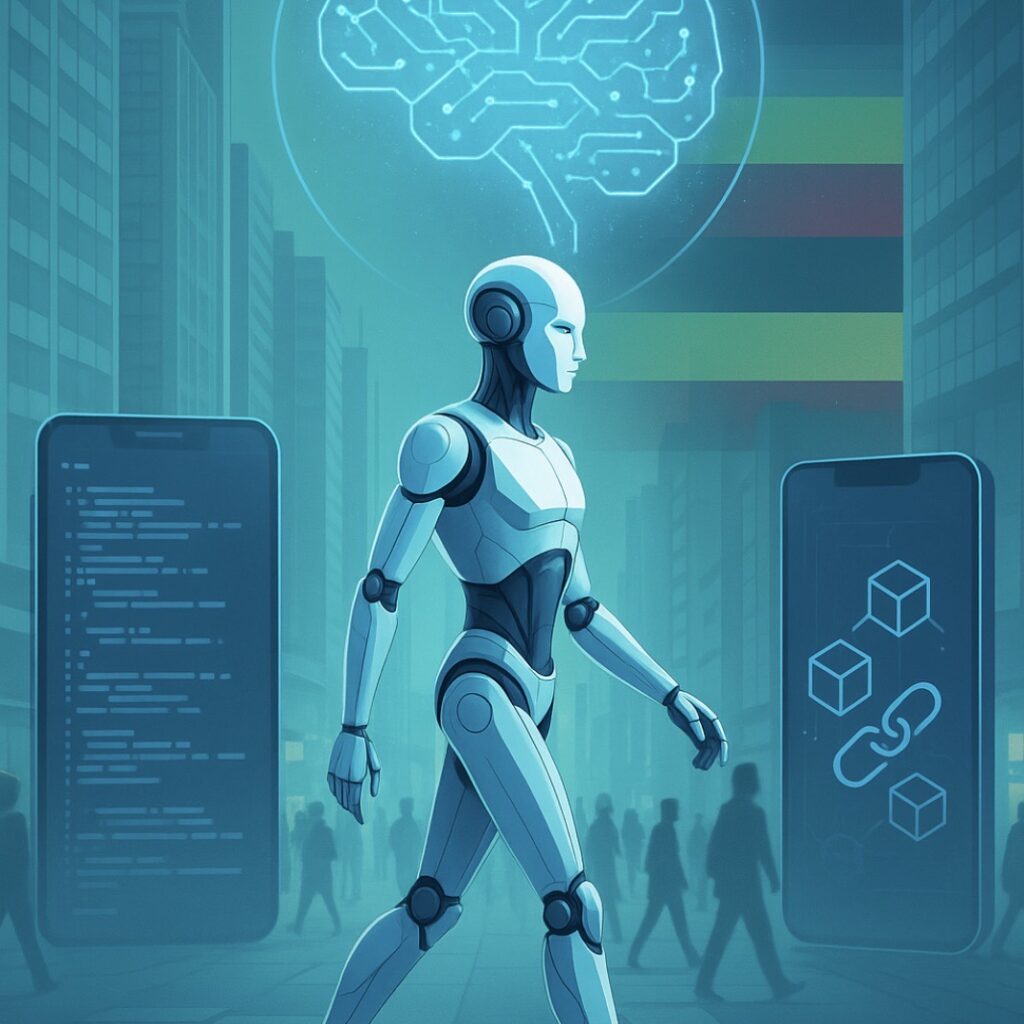By Lynette Agnes Kembabazi

What if I told you that this week, a robot walked through Manhattan’s busy streets, shopping for shoes like any other New Yorker? Or that your next truck delivery might arrive courtesy of a completely driverless vehicle already operating on Texas highways? Welcome to August 2025, where science fiction has quietly become our everyday reality.
The pace of technological change feels overwhelming at times, but this week brought some genuinely exciting developments that could reshape how we live, work, and connect with technology. From breakthrough robotics that actually help people to AI models that understand us better than ever, plus some fantastic updates from Uganda’s thriving tech scene, there’s plenty to unpack.
Let me walk you through what caught my attention and why it matters for all of us, whether you’re a developer in Kampala, a tech enthusiast anywhere in the world, or simply someone curious about where we’re heading.
When Robots Stop Being Scary and Start Being Helpful
Remember when robots in movies were either cute sidekicks or terrifying villains? This week reminded me that reality is far more interesting than fiction. The Uni tree R1 robot didn’t just demonstrate its capabilities in a sterile lab environment. Instead, it took a casual stroll through Manhattan, complete with a shopping trip for shoes. This wasn’t a publicity stunt gone wrong or a tech demo gone rogue. It was part of KraneShares’ $28 million AI robotics fund campaign, showcasing how investment money is flowing into practical robotics applications.
What strikes me about this isn’t just the technical achievement, though that’s impressive enough. It’s the normalcy of it all. Pedestrians walked by, some curious, some indifferent, treating the robot more like street art than an invasion from the future. This tells us something profound about where we are culturally with robotics. We’re ready for them to be part of our world, not separate from it.
Meanwhile, Apple is making moves that suggest they see our robotic future as inevitable and imminent. Their ambitious plans include household robots that could genuinely assist with daily tasks, not just vacuum floors or play music. We’re talking about a dramatically reimagined Siri with lifelike interactions that feel more like conversations with a helpful friend than commands to a digital assistant. The roadmap also includes smart speakers with displays and home security cameras powered by AI that can distinguish between your teenage son sneaking in late and an actual intruder.
This represents a fundamental shift in Apple’s strategy. For years, they’ve been the masters of sleek, passive technology that responds to our touch. Now they’re positioning themselves to create technology that anticipates our needs, acts independently, and integrates seamlessly into our lives without requiring us to adapt to it.
But perhaps the most impressive robotics development isn’t happening in a tech giant’s labs at all. Bot Auto’s Level 4 driverless trucks are already hauling freight between San Antonio, Dallas, and Houston. These aren’t test runs or limited trials. These are commercial operations, moving real goods for real customers, navigating real traffic with all its unpredictability. The implications extend far beyond just logistics. When autonomous vehicles prove themselves in the demanding world of commercial trucking, it becomes much easier to imagine them handling our daily commutes.
The AI Revolution Gets More Personal and Practical
Artificial intelligence has moved beyond the hype cycle into something more valuable: genuine utility. This shift is evident in how creators and educators are approaching AI tools, moving from “Look what this can do!” to “Here’s how this solves real problems.”
The quantum computing breakthrough following Google’s Willow chip announcement is setting the stage for 2025 to be a pivotal year. IBM and other technology leaders are preparing to release new quantum processors that promise to revolutionize how we approach complex computational tasks. For AI development, this could mean training models that are orders of magnitude more sophisticated, processing datasets that are currently beyond our reach, and solving problems we haven’t even learned to ask yet.
Matt Wolfe, who has become something of a trusted guide through the rapidly evolving AI landscape, continues to identify tools that actually make creators more productive rather than just more impressed. His recent recommendations include familiar names like Midjourney, Leonardo, and Stable Diffusion for visual creation, but also practical workhorses like Perplexity, Claude, and ChatGPT’s Code Interpreter for research and analysis. The shift in his approach is telling. We’ve moved from “Here’s what AI can do” to “Here’s which AI tools you should use for specific tasks.”
This practical approach reflects a broader maturation in how we think about AI. The conversation has evolved from replacement anxiety (“Will AI take my job?”) to integration opportunity (“How can AI make me better at my job?”). Content creators like those behind Fireship are exploring how AI can enhance video production, make code tutorials more accessible, and help technical educators reach broader audiences without sacrificing depth or accuracy.
The creator economy is experiencing this shift most acutely. AI isn’t replacing human creativity; it’s amplifying it. Writers are using AI to overcome writer’s block and explore new ideas. Video creators are leveraging AI for editing, thumbnail creation, and even script development. Developers are using AI as coding partners that can suggest solutions, catch errors, and help with documentation. The key insight is that AI works best when it’s treated as a sophisticated tool rather than a replacement for human judgment and creativity.
Uganda’s Tech Scene: Building Africa’s Digital Future
While global tech giants make headlines, some of the most exciting innovation is happening in places like Uganda, where developers and entrepreneurs are solving uniquely African challenges with cutting-edge technology. The DevFest movement, which represents Google’s decentralized approach to technical education and community building, continues to gain momentum across the continent.
DevFest Uganda’s recent events have showcased a community that’s not just adopting global technologies but adapting them for local needs. GDG Kampala has been particularly active in embracing themes around blockchain revolution and building solutions specifically for Africa’s future. Their “Empowering Developers, Igniting Innovation” approach recognizes that African developers aren’t just consumers of technology created elsewhere. They’re inventors, innovators, and problem-solvers addressing challenges that may be unique to their context but relevant to emerging markets worldwide.
The Uganda Developer Summit represents something even more significant: a recognition from government and private sector alike that developer communities aren’t just hobbyist groups but essential infrastructure for economic development. With backing from the Ministry of ICT & National Guidance, the summit emphasizes collaboration between public, private, and global stakeholders. This isn’t just about learning to code. It’s about building the human capacity to create technological solutions that can drive economic growth, improve healthcare delivery, enhance education access, and strengthen democratic institutions.
What’s particularly exciting about Uganda’s developer community is their focus on practical applications. While Silicon Valley might debate the philosophical implications of artificial general intelligence, Ugandan developers are building mobile money solutions that bring financial services to previously unbanked populations. While American startups pitch blockchain concepts to venture capitalists, African developers are implementing blockchain solutions for supply chain transparency and identity verification in contexts where traditional infrastructure is limited.
The emphasis on blockchain technology in particular makes sense given Africa’s unique position. Many African countries have leapfrogged traditional banking infrastructure by embracing mobile money. Now they’re positioned to leapfrog traditional identity systems, property registries, and contract enforcement mechanisms by implementing blockchain solutions from the ground up. This isn’t just technological adoption; it’s technological leadership.
The DevFest format itself represents a democratization of technical education. Rather than requiring developers to travel to expensive conferences in major tech hubs, DevFest brings high-quality technical content, networking opportunities, and skill-building workshops to local communities. The result is a more inclusive global developer ecosystem where geography is less of a barrier to accessing cutting-edge knowledge and opportunities.
Making Sense of It All: Where We Are and Where We’re Going
Looking at these developments together, several patterns emerge that help us understand where technology is heading and what it means for all of us.
First, we’re witnessing the end of technology’s experimental phase and the beginning of its integration phase. Robots aren’t science projects anymore; they’re service providers. AI isn’t a novelty; it’s a productivity tool. Autonomous vehicles aren’t proof of concepts; they’re logistics solutions. This shift from demonstration to deployment represents a fundamental change in how we should think about emerging technologies.
Second, the democratization of advanced technology is accelerating. Whether it’s DevFest bringing Google-level technical education to local communities in Uganda or creators using AI tools to produce professional-quality content without professional budgets, the barriers between cutting-edge technology and everyday users are dissolving rapidly. This has profound implications for economic opportunity, creative expression, and social mobility.
Third, the most successful implementations of new technology are those that solve real problems for real people. Apple’s robotics strategy focuses on household assistance. Bot Auto’s autonomous trucks address labor shortages and safety concerns in long-haul trucking. Uganda’s blockchain implementations tackle identity verification and financial inclusion. The common thread is utility over novelty.
Fourth, regional adaptation of global technologies is becoming increasingly important. The same AI models that help American creators make YouTube videos are helping African entrepreneurs build fintech solutions. The blockchain technology that enables DeFi trading in cryptocurrency markets also enables supply chain transparency for agricultural exports. Technology’s global reach is enabling local solutions at unprecedented scale.
The developer skill evolution we’re witnessing reflects these broader trends. Whether you’re coding in Kampala or San Francisco, the most valuable skills increasingly involve understanding how to integrate AI capabilities, how to work with blockchain implementations, and how to design for autonomous systems. These aren’t future requirements; they’re current market demands.
For individuals navigating this technological landscape, the week’s developments offer both reassurance and guidance. The reassurance comes from seeing technology becoming more helpful and less intimidating. The guidance comes from seeing clear examples of how to engage with new technologies productively rather than defensively.
Looking Forward: Key Developments to Watch
As we move through the rest of 2025, several developments deserve our attention. The quantum computing releases expected from IBM and others could fundamentally change what’s computationally possible, with implications for everything from drug discovery to climate modeling to cryptography. The continued expansion of DevFest events across Africa represents not just educational opportunity but economic development strategy for emerging markets.
The maturation of autonomous vehicle technology beyond controlled environments and into complex real-world applications will likely accelerate adoption timelines across multiple industries. The evolution of AI from impressive demos to reliable tools will continue to transform how we approach creative work, analytical tasks, and problem-solving in general.
Perhaps most importantly, the growing integration between global technology platforms and local innovation communities suggests we’re moving toward a more inclusive and distributed model of technological development. The next breakthrough might come from Silicon Valley, but it might just as easily emerge from a DevFest hackathon in Kampala, addressing challenges and opportunities that only become visible from that particular vantage point.
The week’s developments remind us that we’re living through a remarkable period of technological acceleration, but one that’s increasingly focused on human benefit rather than technical achievement for its own sake. The robots walking through Manhattan aren’t there to replace us; they’re there to help us. The AI tools becoming part of our workflows aren’t there to diminish human creativity; they’re there to amplify it. The developer communities growing across Africa aren’t just consuming technology; they’re creating it.
In the end, this week in tech offers a hopeful vision of our technological future: one where innovation serves human needs, where access to cutting-edge tools is democratized, and where local communities have the resources and knowledge to build solutions for their own challenges while contributing to global progress. It’s a future worth building, and from the looks of this week’s developments, we’re well on our way.
References
1. KraneShares AI Robotics Fund campaign featuring Unitree R1 robot demonstrations in Manhattan
2. Apple’s strategic AI and robotics roadmap announcements including household robots and enhanced Siri development
3. Bot Auto Level 4 autonomous trucking operations between San Antonio, Dallas, and Houston
4. Google Willow quantum chip breakthrough and implications for 2025 quantum computing releases
5. IBM quantum processor development timeline and commercial applications
6. Matt Wolfe FutureTools.io AI tool evaluations and recommendations
7. Fireship YouTube channel technical content and AI integration insights
8. GDG Luwero DevFest Uganda 2024 event completion and community impact
9. GDG Kampala blockchain and African innovation initiatives
10. Uganda Developer Summit public-private partnership framework and Ministry of ICT backing
11. DevFest global community network and technical education programs
12. African blockchain implementation case studies and financial inclusion applications

